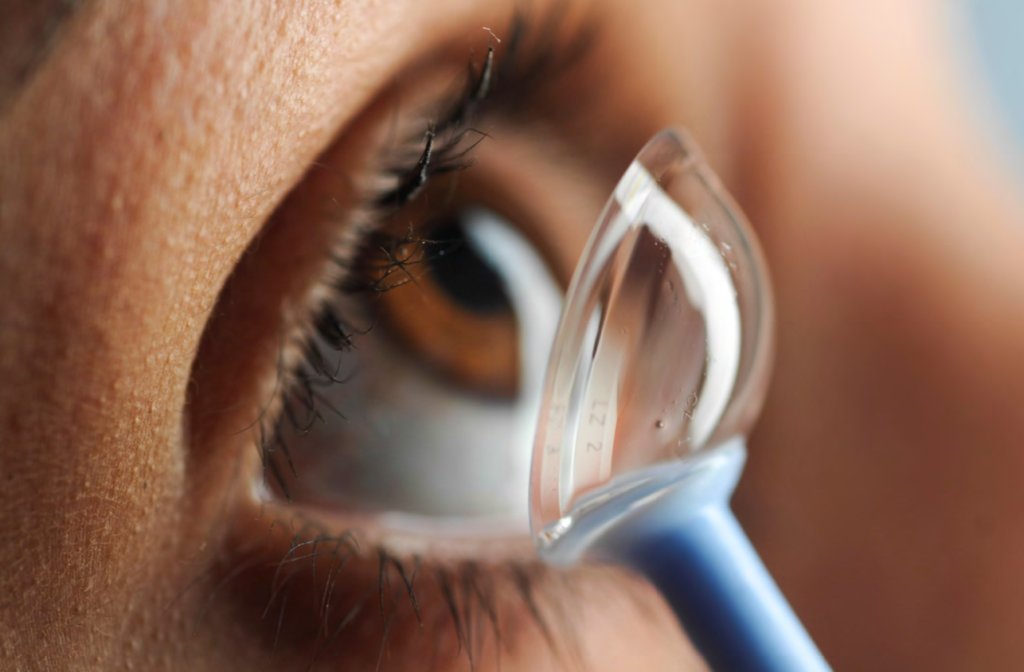Scleral contact lenses have gained attention and popularity due to their unique design and benefits compared to traditional contact lenses. Scleral lenses are specialized contact lenses that are larger in diameter (overall size) than typical contact lenses and rest on the sclera, the white part of the eye, rather than the cornea. These lenses vault over the entire corneal surface, extending onto the sclera, which helps in the case of irregularly shaped corneas or certain eye conditions.
They're typically made of gas-permeable materials, allowing oxygen to pass through the lens to the cornea, which keeps the eye healthy and comfortable. Scleral lenses create a reservoir of fluid between the lens and the cornea, providing constant hydration and a smooth optical surface. This can help correct vision problems caused by irregularities in the cornea, such as keratoconus, astigmatism, or corneal irregularities post-surgery.
Moreover, because they vault over the sensitive corneal surface, scleral lenses can be more comfortable for some people compared to traditional smaller contact lenses. They may also be an option for individuals with severe dry eyes because they retain moisture better and don't touch the corneal surface directly.
Scleral lenses are custom-fitted for each individual's eye shape and condition by an eye care professional. They require proper care and maintenance to ensure eye health and optimal vision correction.
Determining whether scleral lenses are better than soft contact lenses depends on individual needs, preferences, and specific eye conditions. Both types of lenses offer unique advantages and are used for different purposes:
1. Scleral Lenses:
- Advantages: Scleral lenses are larger and vault over the entire cornea, resting on the sclera (white part of the eye). They provide excellent vision correction for irregular corneas, such as in keratoconus or other corneal irregularities. They can also help individuals with severe dry eyes because they vault over the cornea, holding a reservoir of fluid that keeps the eye hydrated.
- Comfort: Scleral lenses may be more comfortable for some individuals as they don't touch the sensitive corneal surface directly, reducing irritation and discomfort compared to traditional lenses.
- Customization: They are highly customizable and can be tailored to fit unique eye shapes and prescriptions.
- 2. Soft Contact Lenses:
- Advantages: Soft contact lenses are comfortable for many users, especially when worn for extended periods. They come in various types, including daily disposables, toric lenses for astigmatism, and multifocal lenses for presbyopia.
- Ease of Use: Soft lenses are relatively easier to adapt to for most people and require less initial adjustment period compared to scleral lenses.
- Breathability: Some modern soft lenses are designed with advanced materials allowing for increased oxygen flow to the cornea, which helps maintain eye health.
- Which is Better?
- Vision Correction: For irregular corneas or specific eye conditions, scleral lenses might provide sharper vision compared to soft lenses.
- Comfort: While comfort is subjective and varies from person to person, some individuals find scleral lenses more comfortable due to reduced irritation on the cornea.
- Ease of Use: Soft lenses are generally easier to handle and adapt to, making them more convenient for everyday wear for many users.
- Moisture Retention: Scleral lenses are often preferred for individuals with severe dry eyes as they keep the eye hydrated by holding a reservoir of fluid between the lens and the cornea.
- The hype around scleral lenses primarily comes from their ability to address specific eye conditions and provide improved comfort and vision for many individuals who may have struggled with other types of contact lenses or vision correction methods.
- While scleral lenses offer several advantages, they are not always the first choice for everyone. They can be more challenging to insert and remove than standard lenses, and fitting them properly requires expertise from eye care professionals. They are also more expensive than traditional contact lenses. Sometimes these lenses are considered medically-necessary and are covered by your vision plan.
- Ultimately, the choice between scleral lenses and soft contact lenses depends on factors like your eye condition, comfort preferences, and the advice of your eye care professional. Consulting with an eye doctor or optometrist will help determine which type of lens is most suitable for your specific needs.

